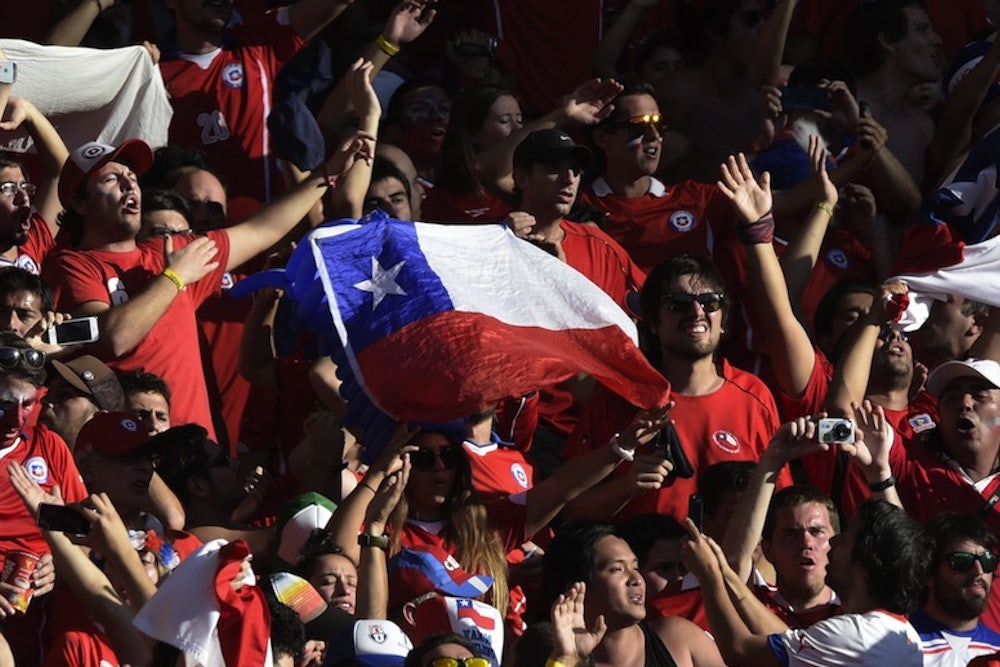All teams carry the weight of their country’s hopes on their shoulders, but perhaps none more so than small but proud countries like Chile, who have a once-in-four-years chance at the World Cup to distinguish themselves in the eyes of the world. Long considered a dark horse, Chile’s talented but underdog team has thrilled throughout the World Cup, first sending the defending Spanish world champions packing with a 2-0 victory and then giving Brazil the scare of its life, taking the game into overtime and penalty kicks. Despite their crushing elimination today, Chile’s feats in this tournament epitomize the stakes for many fans, including myself.
My father’s country is a place of extremes, from its geography to its history to its gap between rich and poor. Chile is one thin line, ten times longer than wide, with the Andes Mountains along its eastern border and the Pacific Ocean at its Western edge. The Atacama Desert sits in the north, and at the country’s southern tip the land fragments into rocky snow and wind-battered islands. News about Chile tends to mirror this bipolar landscape, swinging from the tragic to the triumphant, from Pinochet’s rule to Latin America’s economic success story, from looting in the streets after a major earthquake one year to a “miracle” rescue of 33 miners trapped a half-mile beneath the desert months later, from defying all odds to advance in this World Cup only to face their nemesis, Brazil, at the knockout stage again.
The “beautiful game” is about much more than athleticism, which is one reason why soccer will never take off in the United States as it has in the rest of the world. Despite kids dribbling soccer balls across leafy suburban America, el futbol is not about just rooting for your team, or your city, but for patria and national pride. It’s hard to describe the inner joy and esteem I felt after Chile’s victory over Spain and the disappointment of today’s missed penalty. Despite the doom and gloom from commentators about the difficulty Chile faced in neutralizing the Dutch, Spanish, and Brazilian threats, my father’s faith in his team, in “my boys,” never wavered. He follows Chilean players year-round, and over the last four years he has watched these young talented players mature. Over dinner he updates me on his boys’ every beautiful, game-saving goal and each splendid pass they have made as players on Mexican and European teams including Barcelona, Valencia, Juventus, Napoli, Cardiff, and Monterrey.
But each game offers my father something more than a diversion from the worry of everyday life and an occasion for national pride. These televised matches grant him regular reunions with the Chilenos he left nearly 40 years ago—short, dark men like himself from mostly hardscrabble, working-class backgrounds. In many ways Chile exemplifies “the beautiful game.” La Roja play with a rough, hungry beauty. They are the shortest team in the World Cup, a weakness many commentators noted they would have to overcome in facing their taller opponents. But they more than made up for the height deficit with speed and an aggressive, attacking style. After their win over the Spanish Chilean coach Jorge Sampaoli said, “you could say that we are the rebels of this tournament.”
My father dearly loves these risk-takers, partly because he’s one himself. And like him, they are survivors, having risen above their modest backgrounds to inspire a country. Forty years ago my father risked leaving his country after four years of working in nitrate mines. Middle-aged miners in the small mining town where he worked died of silicosis from inhaling rock dust. Men who had kept him alive by teaching him this dangerous work warned him that he could develop the disease after five years. And people also died in other ways. A fellow brakeman fell in front of a cargo car. Another friend had a son with a married woman who refused leave her husband, and he fell into a deep depression. After going to a soccer match, he sat outside the stadium, jammed a stick of dynamite in his mouth and detonated it. Unable to find work elsewhere, my father gambled and left his country to save himself. During the World Cup he has watched scrappy young men like he was once take hardship and turn it into something beautiful.
Only one country will win the World Cup. Many are happy to have qualified at all. As every Chilean fan knows, supporting a team with much promise but a history of not advancing beyond the round of 16 means getting your heart a little broken when the inevitable elimination occurs. Yesterday we agonized for 139 brutal minutes. But with rising stars Alexis Sanchez, Arturo Vidal, and Eduardo Vargas, and a roster filled with strong, underrated players with nicknames like “the warrior,” and “el pitbull,” this is perhaps the greatest Chilean team ever. The future is bright. And there’s something in learning to take joy not only in the wins but in how your team plays. This is what the World Cup is about. My father has taught me how to relish Chile’s flair, energy and heart. Today we feel sad and disappointed but not defeated. For us, they’ve already won.
